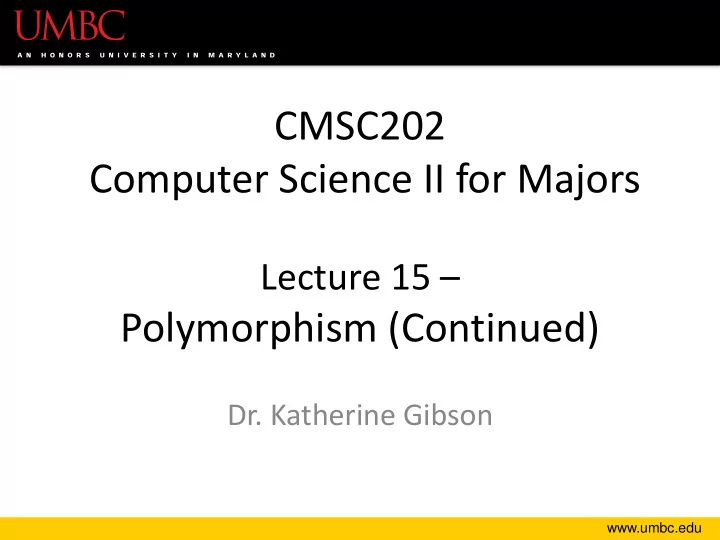

CMSC202 Computer Science II for Majors Lecture 15 – Polymorphism (Continued) Dr. Katherine Gibson www.umbc.edu
Last Class We Covered • Review of inheritance • Overriding (vs overloading) • Understanding polymorphism – Limitations of inheritance – Virtual functions – Abstract classes & function types 2 www.umbc.edu
Any Questions from Last Time? www.umbc.edu
Common Project 3 Error • Have you seen something like this? g++ -Wall -ansi – g -c test1.cpp In file included from test1.cpp:4: TrainCar.h:49: error: expected constructor, destructor, or type conversion before ‘&’ token • The error is not in TrainCar.h! – Where is it? • The “error” is in test1.cpp • Do not change the TrainCar.h file! 4 www.umbc.edu
Today’s Objectives • Review of polymorphism – Limitations of inheritance – Virtual functions – Abstract classes & function types • Finishing polymorphism – Virtual function Tables – Virtual destructors/constructors • Livecoding application 5 www.umbc.edu
Review of Virtual and Polymorphism www.umbc.edu
Overview of Polymorphism • Assume we have Vehicle *vehiclePtr = &myCar; • And this method call: vehiclePtr->Drive(); prototype Vehicle class Car class • Can implement function • Can implement function void Drive() • Can create Vehicle • Can create Car • Calls Vehicle::Drive • Can implement function • Can implement function virtual void • Can create Vehicle • Can create Car Drive() • Calls Car::Drive • Cannot implement function • Must implement function virtual void • Cannot create Vehicle • Can create Car Drive() = 0 • Calls Car::Drive 7 www.umbc.edu
Overview of Polymorphism • Assume we have Vehicle *vehiclePtr = &myCar; • And this method call: vehiclePtr->Drive(); prototype Vehicle class Car class • Can implement function • Can implement function void Drive() • Can create Vehicle • Can create Car • Calls Vehicle::Drive • Can implement function • Can implement function virtual void • Can create Vehicle • Can create Car Drive() • Calls Car::Drive • Cannot implement function • Must implement function virtual void • Cannot create Vehicle • Can create Car Drive() = 0 • Calls Car::Drive 8 www.umbc.edu
Overview of Polymorphism • Assume we have Vehicle *vehiclePtr = &myCar; • And this method call: vehiclePtr->Drive(); prototype Vehicle class Car class • Can implement function • Can implement function void Drive() • Can create Vehicle • Can create Car If no Car::Drive • Calls Vehicle::Drive implementation, calls This is a pure virtual • Can implement function • Can implement function virtual void Vehicle::Drive • Can create Vehicle • Can create Car function, and Vehicle is Drive() • Calls Car::Drive now an abstract class • Cannot implement function • Must implement function virtual void • Cannot create Vehicle • Can create Car Drive() = 0 • Calls Car::Drive 9 www.umbc.edu
Virtual Function Tables www.umbc.edu
Behind the Scenes • If our Drive() function is virtual, how does the compiler know which child class’s version of the function to call? vector of Car* objects SUV SUV Jeep Van Jeep Sedan Sedan SUV 11 www.umbc.edu
Virtual Function Tables • The compiler uses virtual function tables whenever we use polymorphism • Virtual function tables are created for: – Classes with virtual functions – Child classes of those classes 12 www.umbc.edu
Virtual Table Pointer SUV SUV Jeep Van Jeep Sedan Sedan Van 13 www.umbc.edu
Virtual Table Pointer • The compiler adds a hidden variable SUV SUV Jeep Van Jeep Sedan Sedan Van *__vptr *__vptr *__vptr *__vptr *__vptr *__vptr *__vptr *__vptr 14 www.umbc.edu
Virtual Table Pointer • The compiler also adds a virtual table of functions for each class SUV SUV Jeep Van Jeep Sedan Sedan Van *__vptr *__vptr *__vptr *__vptr *__vptr *__vptr *__vptr *__vptr SUV virtual table Jeep virtual table Van virtual table Sedan virtual table 15 www.umbc.edu
Virtual Table Pointer • Each virtual table has pointers to each of the virtual functions of that class SUV SUV Jeep Van Jeep Sedan Sedan Van *__vptr *__vptr *__vptr *__vptr *__vptr *__vptr *__vptr *__vptr SUV virtual table Jeep virtual table Van virtual table Sedan virtual table * to SUV::Drive(); * to Jeep::Drive(); * to Van::Drive(); * to Sedan::Drive(); 16 www.umbc.edu
Virtual Table Pointer • The hidden variable points to the appropriate virtual table of functions SUV SUV Jeep Van Jeep Sedan Sedan Van *__vptr *__vptr *__vptr *__vptr *__vptr *__vptr *__vptr *__vptr SUV virtual table Jeep virtual table Van virtual table Sedan virtual table * to SUV::Drive(); * to Jeep::Drive(); * to Van::Drive(); * to Sedan::Drive(); 17 www.umbc.edu
Virtual Destructors/Constructors www.umbc.edu
Virtual Destructors Vehicle *vehicPtr = new Car; delete vehicPtr; • For any class with virtual functions, you must declare a virtual destructor as well • Why? • Non-virtual destructors will only invoke the base class’s destructor 19 www.umbc.edu
Virtual Constructors • Not a thing... why? • We use polymorphism and virtual functions to manipulate objects without knowing type or having complete information about the object • When we construct an object, we have complete information – There’s no reason to have a virtual constructor 20 www.umbc.edu
Livecoding • Animals (Bird, Cat, and Dog) – All Animals can: Eat(), Speak(), and Perform() • Vector of Animal pointers – what happens? 21 www.umbc.edu
Announcements • Project 3 is due tonight! • Exam 2 is in 1 week – Will focus heavily on: • Classes • Inheritance • Linked Lists • Dynamic Memory • Some Polymorphism 22 www.umbc.edu
Recommend
More recommend